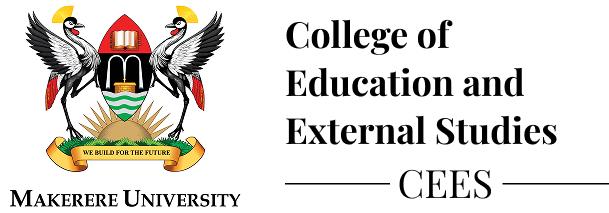
- This event has passed.
PhD Public Defense by Mr. Patrice Ssembirige
October 17 @ 10:00 am – 1:00 pm
INVITATION: The Dean, School of Education under the College of Education and External Studies (CEES), cordially invites you to the PhD Public Defense of the following candidate:
Name of the Candidate: Mr. Patrice Ssembirige
Title of Thesis: Administrators’ Leadership Styles and School Academic Performance: A Case of Selected Secondary Schools in Mukono District-Uganda
Date: Friday 17th October 2025.
Time: 10:00 am
Venue: School of Education Smart Room, College of Education and External Studies, Makerere University
Supervisors:
- Dr. Tebenkana Timothy
- Dr. Kaggwa R. Victoria Tamale
Abstract:
The study explored administrators’ leadership styles and school academic performance in selected secondary schools in Mukono District, Uganda. It employed a mixed methods approach in data collection. The specific objectives were to: (i). determine the influence of participative leadership style, (ii). assess the impact of directive leadership style (iii). examine the effect of supportive leadership style, and (iv). explore students’ perceptions of administrators’ leadership styles and their influence on school academic performance. A cross-sectional survey design was adopted, involving a sample of 32 headteachers, 128 teachers, 32 Directors of Studies, 1 District Education Officer, 1 District Inspector of Schools, and 320 students. Self- administered questionnaires, interview guides, and document review guides were used to collect data. Data was analyzed using Pearson product moment correlation coefficient (r) for quantitative data and narrative analysis for qualitative data. The findings revealed that participative leadership significantly enhances school academic performance through improved teacher involvement, motivation, and communication, with a Pearson correlation coefficient of 0.420. Directive leadership was also found to positively affect school academic performance by providing clear guidance and maintaining discipline, although it was noted to reduce teacher autonomy and motivation, with a correlation coefficient of 0.371. Supportive leadership was strongly correlated with better academic outcomes, promoting a positive school climate and higher teacher morale, with a correlation coefficient of 0.561. Students’ perceptions of administrators’ leadership styles were generally positive, contributing to a conducive academic environment and improved academic performance, with a correlation coefficient of 0.367. The study concluded that while all the three leadership styles positively influence school academic performance, supportive and participative styles were more effective in fostering a collaborative and supportive school environment. It also highlighted the need for a blended approach to leadership. Recommendations included implementing regular participative decision-making opportunities, balancing directive leadership with flexibility, prioritizing emotional support for teachers, and fostering an open communication system with students.
Keywords:
Administrators, Leadership Styles, Academic Performance.
Your presence and participation will be highly appreciated as we support the student in this important academic milestone.
